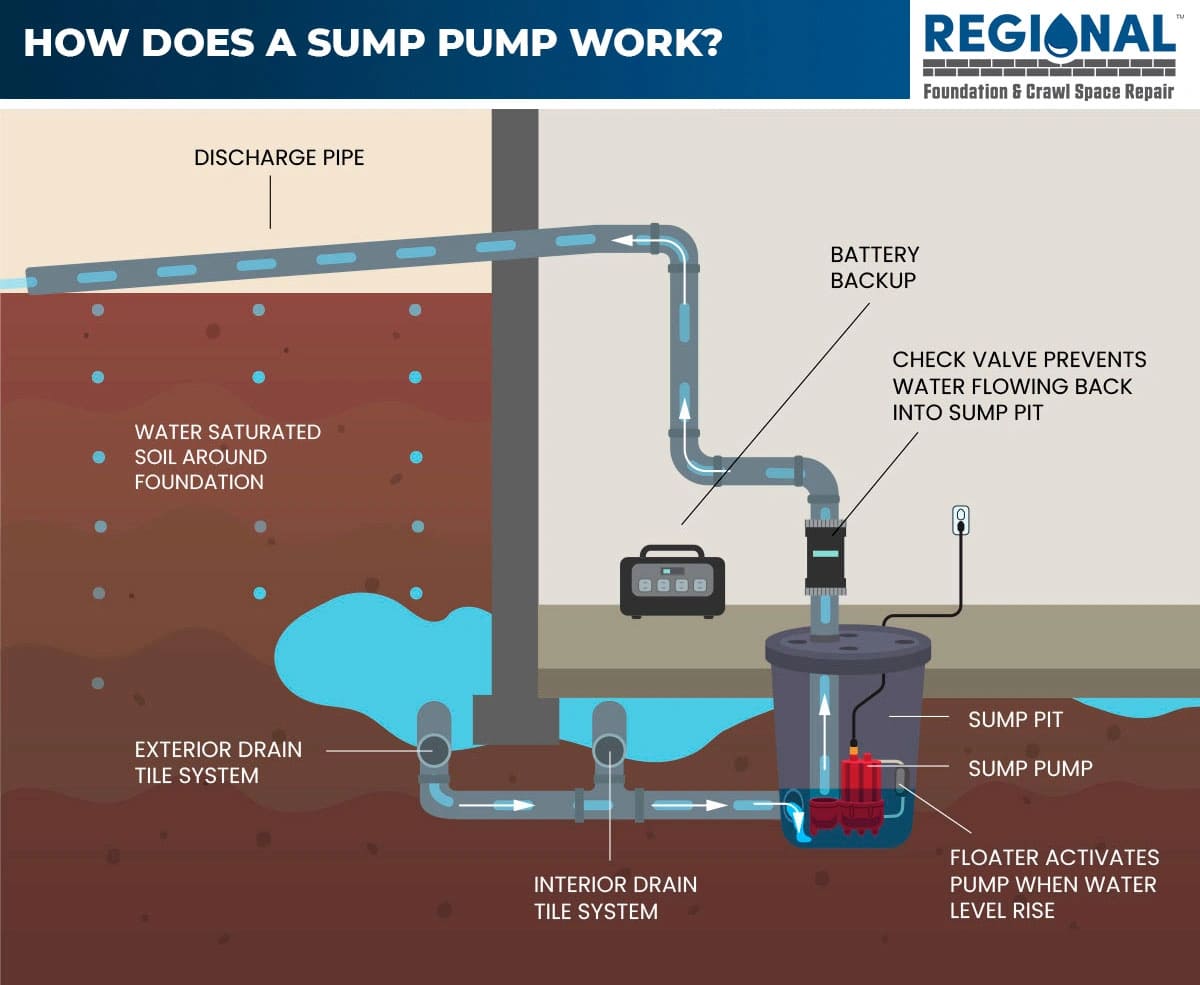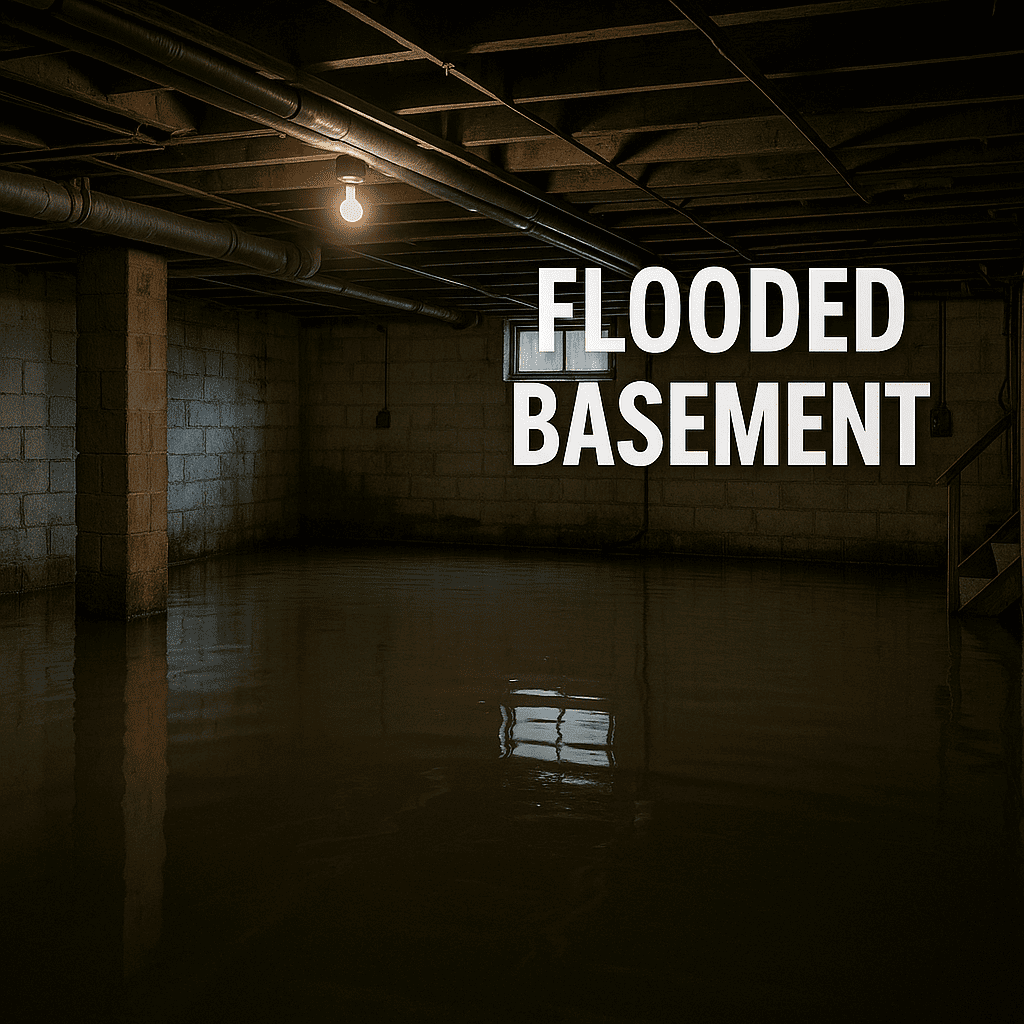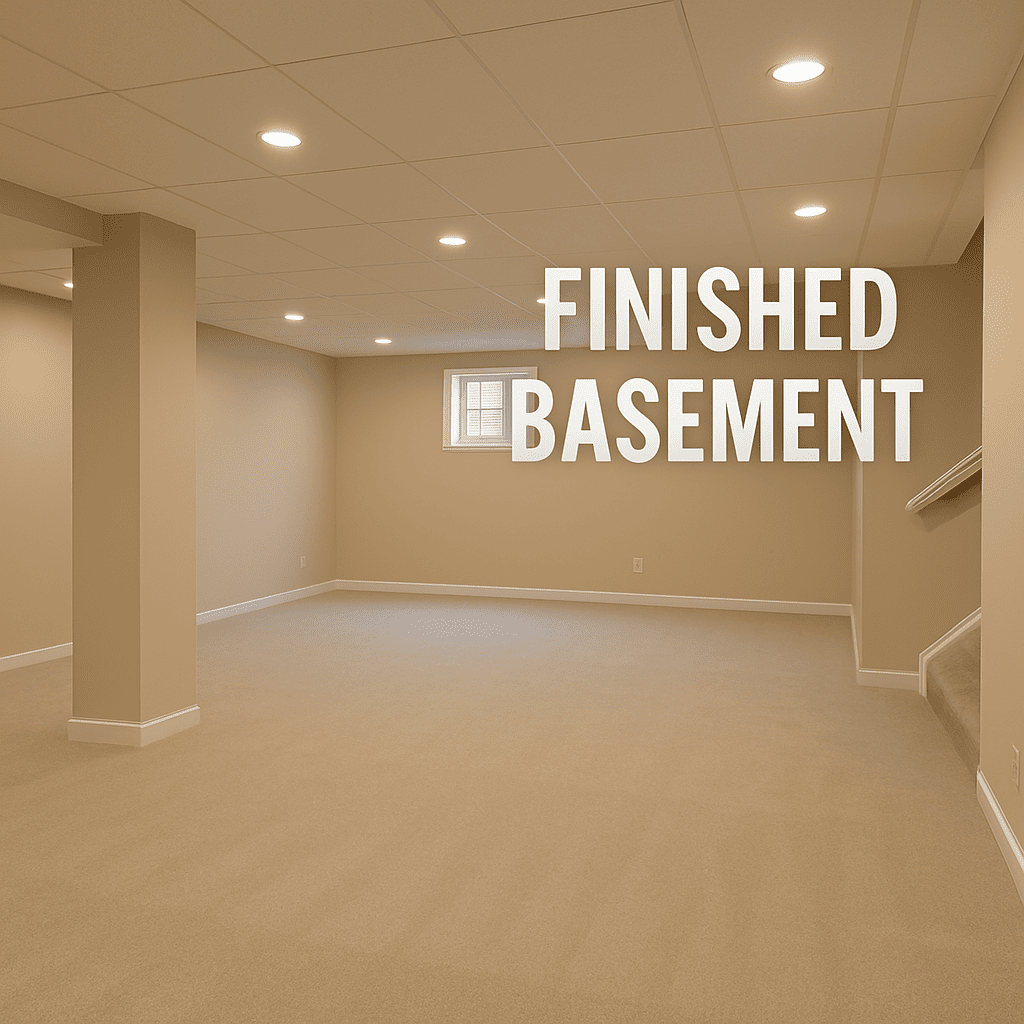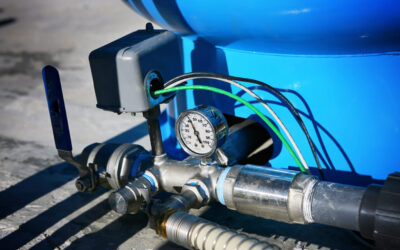
A single inch of rainfall can dump over 1,250 gallons of water onto your 2,000-square-foot roof – making basement moisture control essential for Knoxville homeowners. That water has to go somewhere, and without proper management, it often finds its way into your basement, creating ongoing dampness and potential flooding.
Dealing with moisture in your basement isn’t just about preventing puddles. Consequently, these wet conditions lead to serious health concerns as mold and mildew develop, worsening respiratory issues and triggering allergic reactions. Additionally, basement water leakage can deteriorate supporting structures and compromise your home’s integrity. Whether you’re experiencing water seeping through foundation cracks during heavy rain or struggling with Tennessee’s humid summers causing condensation, there are effective solutions to keep moisture out of basement areas.
Throughout this guide, you’ll discover practical basement moisture control systems that actually work for Knoxville homes. From installing sump pumps that efficiently collect and redirect water away from your foundation to maintenance practices like cleaning gutters twice yearly, we’ll cover straightforward approaches to solve your wet basement problems for good.
Why Your Basement Gets Wet in Knoxville’s Challenging Climate
Knoxville’s unique climate presents specific challenges when it comes to keeping your basement dry. Understanding these regional weather patterns helps you develop effective basement moisture control strategies tailored to East Tennessee conditions.
1. Heavy Rains Make Your Basement Get Wet in Knoxville
East Tennessee experiences significant rainfall, particularly during spring and early summer. These downpours can quickly overwhelm your home’s water management systems, especially if they aren’t properly maintained.
When heavy rains saturate the ground around your foundation, hydrostatic pressure builds up, forcing water through even the tiniest cracks in your basement walls. Furthermore, Knoxville’s rolling topography means homes in valley areas or at the bottom of slopes face increased risk of water runoff collecting around foundations.
2. High humidity levels in summer
Summer in Knoxville brings more than just heat – humidity levels regularly exceed 80% during the warmer months. This high moisture content in the air naturally migrates to cooler spaces, specifically your below-grade basement.
When warm, moist air meets cool basement surfaces, condensation forms on walls, floors, and exposed pipes. Over time, this persistent dampness creates ideal conditions for mold growth, musty odors, and deterioration of stored items.
3. How Freeze-Thaw Cycles Cause Your Basement to Get Wet
Though milder than northern states, Knoxville winters still feature temperature fluctuations that hover around freezing. These freeze-thaw cycles are particularly damaging to basement structures.
When water in soil freezes, it expands by approximately 9%, putting pressure on foundation walls. Then, as temperatures rise and ice melts, the resulting water can seep into newly formed cracks. This cyclical process gradually widens existing foundation weaknesses, ultimately allowing more moisture into your basement.
4. Soil expansion and contraction
The clay-heavy soils common around Knoxville present another moisture challenge. These soils expand dramatically when wet and shrink when dry – a process that repeatedly stresses your foundation.
During rainy periods, expanding soil pushes against foundation walls. Then, during drought conditions, the soil contracts, potentially creating gaps where water can collect during the next rainfall. This constant movement may lead to foundation settling, creating new entry points for unwanted moisture.
By recognizing how these specific climate factors affect your Knoxville basement, you can implement targeted solutions to address each seasonal challenge and maintain a dry, healthy living space year-round.
Common Signs of Basement Water Leakage
Image Source: My Foundation Repair
Pro tip: Watch your gutters during a rainstorm. If you spot water pouring over the sides instead of flowing through downspouts, immediate cleaning is needed.
Recognizing the early warning signs of basement water problems saves you thousands in potential repair costs later. Your basement communicates moisture issues through various signals long before major damage occurs.
1. Musty odors and damp air
That distinctive “basement smell” isn’t normal—it’s a reliable indicator of excess moisture. According to the EPA, musty odors typically signal mold or mildew presence. Even if you can’t see visible growth yet, your nose knows when moisture levels are too high.
Excess humidity in the basement creates a stale atmosphere that makes the space feel uncomfortably damp. This sensation occurs because basements are naturally cooler, causing humid air to condense on cold surfaces. While some homeowners dismiss this as “just how basements smell,” persistent mustiness always indicates an underlying moisture problem requiring attention.
2. Water stains or efflorescence on walls
White, chalky deposits on basement walls aren’t mold—they’re efflorescence, mineral salts left behind when water evaporates from concrete. These powdery substances appear harmless but serve as clear evidence that water is penetrating your foundation walls.
Besides efflorescence, look for discoloration on walls or ceilings, particularly yellowish-brown stains that develop over time. Water stains often appear after heavy rains and may gradually expand if the source remains untreated.
3. Mold or mildew growth
Mold thrives wherever moisture, warmth, and organic material exist—making basements perfect breeding grounds. Common basement molds include Cladosporium, Penicillium, and Aspergillus.
Visible mold typically appears as fuzzy black, green, or white patches on walls, floors, or stored items. Beyond the esthetic issue, mold poses serious health concerns, potentially triggering allergic reactions, respiratory problems, and eye irritation. The CDC advises professional remediation for areas larger than 10 square feet.
4. Peeling paint or warped flooring
When paint begins bubbling or peeling from basement walls, it’s almost certainly due to moisture pushing outward from behind the surface. This occurs because water destroys the bond between paint and wall.
Similarly, warped or buckling floors indicate moisture absorption. Wood materials swell when wet, causing visible distortion. Even concrete floors show damage through cracks or uneven surfaces where moisture has compromised structural integrity.
Moisture Control Systems That Work in Knoxville
Image Source: Regional Foundation & Crawl Space Repair
What to Do Next If Your Basement Gets Wet Frequently
Effective moisture control in Knoxville basements requires solutions tailored to our region’s specific challenges. The following systems have proven particularly successful in managing water issues common to East Tennessee homes.
1. Sump pumps with battery backup
Sump pump systems remain the frontline defense against basement flooding, collecting water in a basin and pumping it away from your foundation. Given Knoxville’s frequent power outages during storms, battery backup capabilities are essential. Many homeowners choose models like the Basement Watchdog Big Dog CONNECT, which offers impressive pumping power (3,500 GPH at 0 ft; 2,200 GPH at 10 ft) and dual float switches for added protection. For optimal reliability, look for pumps with automatic testing features and remote notification capabilities.
2. French drains and yard grading
Proper yard grading creates a gentle slope (3-10% grade) that directs water away from your foundation. For homes with persistent drainage issues, French drains—trenches filled with gravel and perforated pipe—channel water away from problem areas. Professional installation typically includes a perforated pipe wrapped in filter fabric and rock, installed 18+ inches below ground with a positive slope toward the outlet.
3. Interior vapor barriers and wall sealants
Interior moisture barriers prevent water vapor from penetrating your basement walls. High-quality solutions like AquaStop WallSeal™ use 12-mil thick sheets secured to basement walls, directing any seepage into your drainage system. These barriers effectively block moisture while channeling any collected water to your drainage system.
4. Crawl space encapsulation
Crawl space encapsulation involves sealing the area beneath your home with a vapor barrier, typically made of polyethylene. This creates a moisture-proof boundary that prevents ground dampness from affecting your home. Benefits include improved indoor air quality, reduced energy costs, and protection against mold growth. Most professional installations include vapor barriers, drainage systems, and dehumidifiers working together as a complete moisture control solution.
5. Basement dehumidifiers
Dehumidifiers specifically designed for basements extract moisture from the air, preventing condensation issues. Unlike standard household units, basement dehumidifiers like the SaniDry Sedona can operate in temperatures as low as 55°F and feature continuous drainage options rather than buckets to empty. For Knoxville homes, models rated for high-humidity environments with automatic humidistats work best.
6. Gutter guards and downspout extensions
Properly functioning gutters with quality gutter guards prevent debris buildup that can cause overflow near your foundation. Extend downspouts at least 4-6 feet from your home’s foundation to prevent water pooling. Underground gutter downspout extensions offer an esthetically pleasing solution by directing water away through buried drainage pipes.
How to Prevent Basement Flooding During Heavy Rain
Image Source: Triad Basement Waterproofing
Preventing basement flooding starts with simple, proactive measures you can implement before the next Knoxville downpour hits. These practical steps will protect your foundation and keep your basement dry, even during the heaviest seasonal storms.
1. Clean gutters and check for clogs
Clogged gutters quickly overflow during rainstorms, sending cascades of water directly to your foundation. You should clean your gutters at least twice yearly-in spring and fall-to prevent this common flooding cause. For homes with nearby trees, more frequent cleaning may be necessary as leaves, twigs, and pine needles can rapidly block water flow.
2. Direct water away from foundation
The critical rule for preventing basement flooding is moving water away from your home’s foundation. Downspout extensions should discharge water at least 6-10 feet from your house. In many Knoxville neighborhoods with clay-heavy soil, proper drainage becomes even more essential.
For persistent drainage issues, consider installing a swale-a shallow trench redirecting water to a safe release area-or implementing underground drainage pipes. The ground should slope away from your home approximately one inch per foot for effective drainage.
3. Install window well covers
Window well covers serve dual purposes: preventing debris accumulation and blocking rainwater entry. Quality covers made from polycarbonate plastic can support up to 400 pounds while still allowing emergency escape. These covers effectively shed water away from your basement windows rather than allowing it to pool against them.
Clear covers also permit natural light while keeping leaves, snow, and rain out-addressing a common entry point for basement flooding.
4. Seal basement windows and vents
Basement windows often develop leaks over time as foundations shift and window seals deteriorate. Inspect your basement windows regularly for cracks or gaps in the caulking, particularly after freeze-thaw cycles common in Knoxville winters.
For proper window sealing, first remove old, damaged caulk with appropriate tools, then clean the surface thoroughly before applying new polyurethane caulking designed specifically for basement windows. Remember to seal both interior and exterior window frames for complete protection.
Need Help Because Your Basement Gets Wet?
Dealing with a wet basement doesn’t have to be an ongoing struggle for Knoxville homeowners. Throughout this guide, we’ve explored how East Tennessee’s unique climate creates specific moisture challenges, from heavy seasonal rains to high humidity levels and problematic freeze-thaw cycles.
Recognizing the warning signs early-musty odors, water stains, mold growth, or warping materials-allows you to address issues before they cause serious damage. Remember, these indicators should never be ignored as they signal potentially costly problems developing beneath the surface.
Fortunately, effective solutions exist specifically designed for Knoxville’s moisture challenges. Sump pumps with battery backup provide essential protection during storms, while proper drainage systems direct water away from your foundation. Additionally, vapor barriers, crawl space encapsulation, and quality dehumidifiers work together to create comprehensive moisture control systems tailored to your home’s specific needs.
Prevention remains your most powerful tool against basement flooding. Therefore, maintaining clean gutters, properly directing water flow, and sealing potential entry points significantly reduces your risk during heavy rainfall. These simple yet effective measures protect your home’s foundation and keep your basement dry year-round.
Above all, a dry basement contributes to your family’s health and your home’s structural integrity. Though basement moisture problems can seem overwhelming at first, the right approach makes them manageable. Sanders Plumbing Company stands ready to help you implement these proven solutions, ensuring your Knoxville basement stays dry regardless of what Mother Nature brings.
Don’t wait for the next heavy rain to take action. Start implementing these moisture control strategies today and transform your damp basement into a dry, usable space your family can safely enjoy for years to come.
Meet the Founders: Vickie and James (Pete) Sanders
Vickie Sanders is the co-owner of Sanders Plumbing Company and a driving force behind its success. She and her husband, Pete (James W. Sanders), have been married and working together for over 35 years, building the company from the ground up. Known for her bright personality and dedication, Vickie is often described as the “neck that turns the head” of the business, supporting operations, marketing, payroll, and HR. She is recognized in the Knoxville community for her involvement in local networking events, her love of gardening and hippos, and her reputation as an outstanding cook who often brings treats to the office. Vickie’s leadership and warmth help create a welcoming, family-oriented atmosphere at Sanders Plumbing Company
James W. “Pete” Sanders is the founder and co-owner of Sanders Plumbing Company in Knoxville, TN. Pete began his plumbing career working alongside his father as a child, attended trade school in high school, and worked at a local plumbing company before graduating in 1984. In 1989, he founded Sanders Plumbing, quickly becoming one of the youngest plumbers in Knoxville to earn a Master’s license. Under Pete’s leadership, the company has earned a reputation for expertise, integrity, and community service, growing into a respected local institution. Pete is also active in professional organizations, serving on the Executive Advisory Board of Success Group International, and remains committed to upholding the highest standards in the industry. He and Vickie have two children and are deeply rooted in the Knoxville community
Location
Knox County reach form Knoxville, TN: Though based in the vibrant city of Knoxville, Tennessee serves local homeowners, extending it’s customer care plumbing service to homes throughout the community.
Pro tip: Check your basement after heavy rainstorms to identify potential entry points before they become major problems.
Why Trust Sanders Plumbing Company
Homeowners across Knoxville trust Sanders Plumbing Company because of our unwavering commitment to quality, honesty, and customer satisfaction. With over 35 years of experience serving the local community, our team delivers fast, reliable service-whether it’s a simple repair or a major installation. Customers consistently praise our professionalism, clear communication, and attention to detail, noting that we treat every home with care and respect. We offer upfront pricing, stand behind our work with a satisfaction guarantee, and are always ready to help-day or night-so you can feel confident you’re getting the best service at a fair price.

Live in Knoxville and a fixin your plumbing?
Frequently Asked Questions about Basement Moisture
What are the main causes of basement moisture in Knoxville?
The primary causes include heavy seasonal rains, high humidity levels in summer, freeze-thaw cycles in winter, and soil expansion and contraction. These climate factors can lead to water seepage through foundation cracks and increased condensation in basements.
How can I tell if my basement has a moisture problem?
Look for signs such as musty odors, damp air, water stains or white chalky deposits (efflorescence) on walls, visible mold growth, and peeling paint or warped flooring. These indicators suggest excess moisture that needs to be addressed.
What are effective moisture control systems for Knoxville basements?
Effective systems include sump pumps with battery backup, French drains and proper yard grading, interior vapor barriers, crawl space encapsulation, basement dehumidifiers, and well-maintained gutters with downspout extensions. These work together to manage water and humidity levels.
How can I prevent basement flooding during heavy rain?
Regularly clean gutters and check for clogs, direct water away from your foundation using downspout extensions, install window well covers, and seal basement windows and vents. These steps help protect your basement from water intrusion during storms.
Is it normal for basements to smell musty?
No, a persistent musty smell is not normal and indicates excess moisture. It’s often a sign of mold or mildew presence, which can pose health risks. If you notice a musty odor, it’s important to identify and address the underlying moisture issue promptly.
Related Articles
Cannot Stand Low Water Pressure? Your Knoxville Plumber Has the Answer
Weak showers and slow-filling sinks can make your daily routine frustrating. A simple solution to boost water pressure in your home could change everything. Many Knoxville homeowners deal with water pressure problems, as readings below 40 psi signal trouble. The sweet...











0 Comments